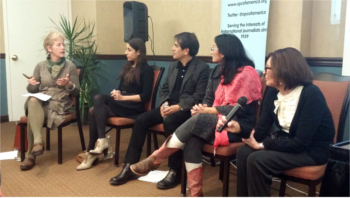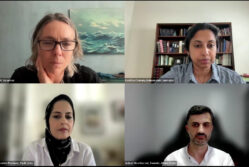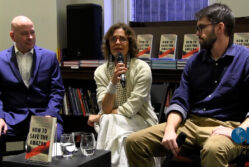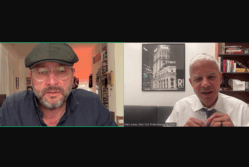Event Coverage Highlight

Panel Probes French and American Bounds of Satire

Left to Right: Signe Wilkinson, Guénola Pellen, Felipe Galindo, Asra Nomani and Jacqueline Albert-Simon.
Responses to last month’s attacks on journalists at the French magazine Charlie Hebdo brought to light key differences between French and American attitudes about satire and free expression. Many American media defended freedom of expression, but also declined to publish cartoons depicting the prophet Mohammed. In France, newsstands sold out of a special printing of the magazine, which depicted the prophet’s image on its cover.
A range of views about deliberately offensive humor was reflected among panelists in an OPC panel discussion on Feb. 12 titled “Toujours la Différence: Why French and American Satirical Cartoonists Are Different. Are Pictures Multilingual?”
Signe Wilkinson of the Philadelphia Daily News, a three-time winner of the OPC’s Thomas Nast award for best cartoons on international affairs, told attendees that her readers had shown “selective” outrage about religious symbolism in cartoons.
“To me, the whole issue of what’s sacred and what’s not depends on whether it is favorable to the group whose symbol it is,” she said.
Wilkinson said her name had appeared on lists of journalists considered to be most anti-Semetic, most anti-Catholic and most anti-Muslim all in a single year. “Cartoonists don’t kill people, humorless fundamentalists do,” she added.
Guénola Pellen, editor-in-chief of France-Amérique, said France has a long tradition of deliberately offensive humor with roots that stretch back before the French revolution. “It’s difficult maybe for some Americans to grasp this humor because it’s particularly mean and heavy, and anarchist, in a way,” she
said.
said.
Felipe Galindo, widely known as Feggo, a Mexican cartoonist working in the U.S. who has been published in The New Yorker and The New York Times, was a close friend of one of the cartoonists killed in the Charlie Hebdo attack, Georges Wolinski.
“When I saw his name among the people assassinated, I was really shocked, and I was very angry,” he said. Galindo is currently looking for a space for an exhibition of cartoons in New York, partly as a way to cope with the grief. Asra Nomani, a Muslim feminist author and former Wall Street Journal reporter, urged people to speak more honestly about intolerance. “This culture of censorship, this culture of checking yourself, has made it so that in 2015 it’s very difficult for us to talk in America about issues regarding Islamic extremism,” she said.
Click in the window below to watch the entire program.



